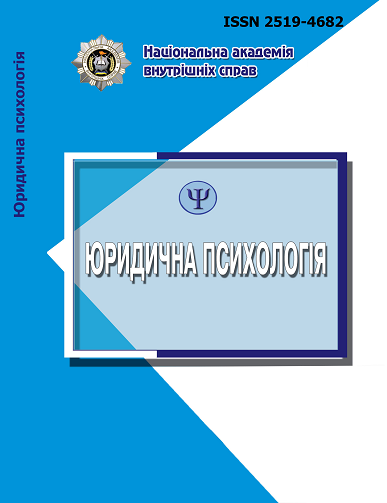The Interaction of Philosophy, Psychology and Semiotics in the Study of Concepts of the Intelligence
Keywords:
intelligence, thinking, philosophy, psychology, semiotics, semiotics of law
Abstract
In the article the historical development of ideas about the human intelligence as an object of study of philosophy, psychology and semiotics from the early modern period to the Contemporary era is considered. Philosophical, psychological and semiotic discoveries of famous thinkers from different periods are characterized. It is generalized that work in the field of psychology of intelligence can be divided into three large groups (not taking into account many smaller): 1) psychogenetics of intelligence; 2) general psychology of intelligence; 3) differential psychology and psychometrics of intelligence. Author also notes that all modern theories of intelligence can be divided into testological (directed on the quantitative measurement of intelligence) and experimental psychological (focused on the detection of mechanisms of intellectual activity). Among the experimental psychological theories the number of approaches to the interpretation of the nature of intelligence was generalized and named based on a well-known classification and these approaches were highlighted by the author. Author believes that some experimental psychological approaches arose as a reaction to the contradictions and disadvantages of the test theories of intelligence; some were substantiated as a result of attempts to explain the individual differences in the results of the test execution. Each of these approaches has a certain impact on others, so there is a phenomenon of its interpenetration. It is obvious that today intellect can not be equated with thinking in general, as it was done for a long time in the twentieth century, but the «measuring» psychology, which received the greatest development, also proved to be ineffective to determine what this phenomenon is at the conceptual level. Author supports the opinion of modern researchers in the field of psychology of intelligence that intelligence is a form of organization of individual mental experience in the form of existing mental structures generated by them mental reflection space and mental representations of reality, being built within this space. The article notes that this well-known cognitive psychology approach with the full right can be considered semiotics approach. Summing up, semiotic and semiotics- legal approaches and the use of logic methods provide an opportunity to establish optimal forms of algorithmization of intellectual activity of a law-enforcement practitioner. This allows us to determine the structure of legal sign constructions that used in legal activities. Also this allows doing reflection the content of a particular legal procedure correctly. At the same time, the detailed development of the semiotic-legal methodology is still ongoing and determines the prospects for scientific research. These studies are impossible without interaction with other branches of knowledge, in particular, philosophy and psychology, the study of the traditions of the scientific development of relevant concepts and the use of theoretical achievements of previous generations of thinkers, the involvement of the categoryterminology apparatus of modern theories and productive dialogue with modern interdisciplinary areas of scientific research.Downloads
Download data is not yet available.
Abstract views: 242 PDF Downloads: 277
Issue
Section
Theoretical and methodological issues of legal psychology
- Authors reserve the right to authorship of their own work and transfer to the magazine the right of the first publication of this work under the terms of the Creative Commons Attribution License, which allows other persons to freely distribute published work with mandatory reference to authors of the original work and the first publication of an article in this magazine.
- Authors have the right to enter into separate additional agreements on non-exclusive dissemination of the work in the form in which it was published in the journal (for example, to post an article in the institution's repository or to publish as part of a monograph), provided that the link to the first publication of the work in this journal is maintained.
- The journal's policy allows and encourages the posting of articles by authors on the Internet (for example, in electronic storehouses of institutions or on personal websites), both before the submission of this manuscript to the editorial office and during its editorial processing, as this contributes to the creation of a productive scientific discussion and positively affects the efficiency and dynamics of citing the published work.




